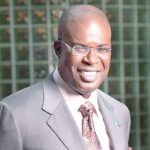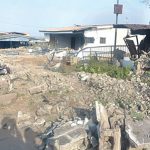How do you think some of the thorny national issues carried over from 2019 into the new year may affect Nigerians?
There are many thorny national issues that the Nigerian State contended with in 2019 that we just exited. Nigerians will still have to grapple with the same issues in the current year. Such issues include the fraudulent electoral process, border closure, debate on fuel subsidy, Boko Haram, banditry, kidnapping, rubber stamp National Assembly, debt portfolio, underperforming budget and many others. On the electoral process, though the 2019 general election may have come and gone, the horrors associated with the election is still fresh in the memories of many Nigerians to the extent that it has been described by many, including civil society organisations and the international community, as one of the worst elections that have been conducted in the history of elections in Nigeria. In fact, some commentators have described the 2019 general election variously as electoral wars, gun powder election and a reversal of 2015 achievements of the Professor Atahiru Jega-led Independent National Electoral Commission (INEC).
There is a myriad of problems associated with the 2019 general election such as the massive violence that greeted the elections; poor planning and operational deficits of the electoral management body, as well as the unprofessional conduct of the security agencies, who scared away and suppressed voters. This plethora of problems made both domestic and international observers to unequivocally call for a rigorous overhaul of the existing Electoral Act. Nigerians will still have to grapple with the horrific events that occurred in the elections and the low integrity of the electoral process. Many Nigerians seemed to have lost hope in the INEC, government and the electoral process to the extent that many have developed apathy for future elections. This will continue to pose a serious challenge to the conduct of future elections, except proactive steps are taken to overhaul the electoral process through a robust review of the Electoral Act.
You made mention of other problems, what can you make of them?
Yes, there were a lot of carry-overs to battle with in the New Year. Tthere are many critical issues that were not resolved in 2019 and these will continue to be major issues for deliberation and action in 2020. These issues cut across security, rule of law, economy and international relations, especially between Nigeria and other African countries.
The policy on the border closure has been praised by many Nigerians as one of the best policies of President Muhammadu Buhari’s administration. However, the border closure policy caused so much resent among Nigeria’s near neighbours because of its biting effects on their domestic economies. Notwithstanding the positive effects of the policy to the Nigerian economy, in terms of protecting the local industries and businesses, there are also some resenting voices against the policy within some Nigerian business circles and among some public commentators who are of the opinion that the border closure is negatively affecting their businesses.
On security, 2019 witness high level of security threats orchestrated by bandits, kidnappers and Boko Haram insurgents, among others. All these are likely to continue into the new year. Just last Thursday, some parts of Adamawa State came under intense attack by Boko Haram but they were repelled by the Nigeria soldiers. In his new year message, the president has reminded us that, as the Commander-in-Chief, it is his primary responsibility to provide security for all Nigerians. In the new year, addressing these security challenges will be a major task of the government.
Do you see members of the National Assembly, as a check on the executive arm of government, helping to pilot well the affairs of the country?
Well, for me the Nigerian National Assembly is yet to give Nigerians the needed representation they are yearning for. My feeling is that the legislative arm of government will continue to generate public concern, especially because many Nigerians believe that the leadership of the ninth National Assembly has demonstrated its unflinching support for the president. Many Nigerians believe that this attitude of the leadership of the National Assembly is against the principle of Separation of Powers (SoP) which promotes independence of each arm of government from the others. The National Assembly has also put itself on the public spotlight and criticism, with the N37 billion cleverly infused in the 2020 Budget which is intended to be used to renovate the National Assembly Complex, which was entirely built with seven billion naira about 20 years ago. For a long time, Nigerians will continue to criticise the National Assembly on these issues.
Are you saying the federal lawmakers cannot help in improving the national economy?
If they can, we would have notice in 2019. This is because the national economy, which managed to exit from recession in 2019, has continued to remain in a precarious condition in 2020. This is exemplified by the fact that almost 100 million Nigerians are still trapped in the poverty net and the dangerously increasing debt profile of Nigeria, including the soaring incidence of unemployment, especially amongst the youths who constitute about 60 per cent of Nigeria’s 201 million population. There is also the problem of poor budget performance. In fact, most of the ministries, departments and agencies of the government could barely access 3 per cent of their budgetary allocations. This is also a major challenge that 2020 budget may likely face.
What policies would you expect Nigeria’s critical stakeholders to impress the government to pursue in the 2020?
Due to myriad of challenges that the Nigerian State has been grappling with, many Nigerians would expect that the Federal Government, in particular, should take bold steps in the current year to seriously and proactively address the structural deficits in the economy by restructuring the economy through necessary policies as well as diversifying the economy and encourage the agriculture, mining and manufacturing sectors so as to create massive jobs and empowerment for millions of people.
Nigerians would want to set an agenda for the government in the area of designing a national strategy to fight the myriad of insecurity plaguing the country. Although, a national security strategy has recently been launched to address security challenges in the country, there is the need for the government to ensure that this document is thoroughly implemented to address the roots of insecurity in Nigeria, with human security elements as the focal areas to be addressed frontally. This can be done, not only through the intervention of the security agencies but, more importantly, through the instrumentality of governmental policy making and implementation to address poverty, unemployment, infrastructural deficits and power challenge.
Nigerians will also want the government to create the enabling environment or even champion the review of the Electoral Act to address the inherent weaknesses in the Act as a way of strengthening the electoral process. Most Nigerians would also want to see the Federal Government deregulating the power sector to allow states that are willing to generate their power to do so. It should also place its focus on increasing power generation and distribution to make power readily available to all Nigerians so as to stimulate economic growth.
Nigerians would expect that the Federal Government should review downward the recent increase of the VAT and electricity tariff so as to alleviate the sufferings of many Nigerians. Finally, Nigerians will also expect that government should review her border closure policy, with a view to ensuring its efficacy in contributing to the national economy and to also ensure whether there is need to sustain the policy or not.






